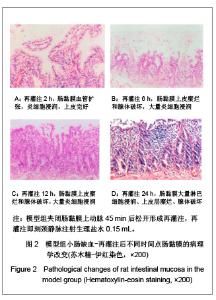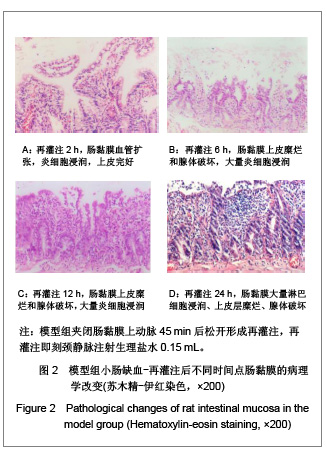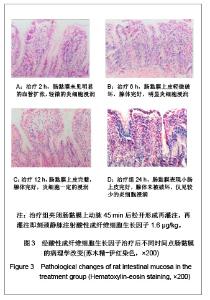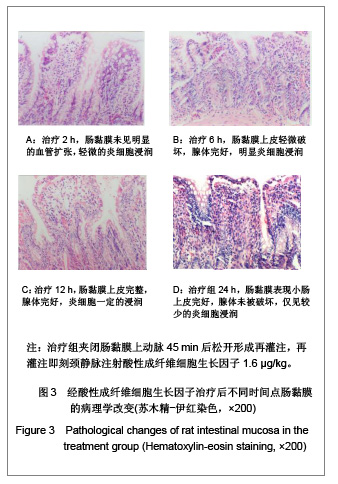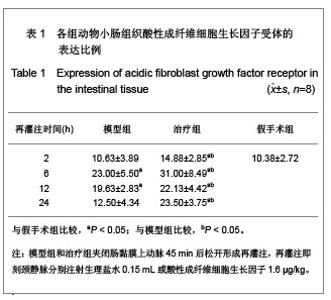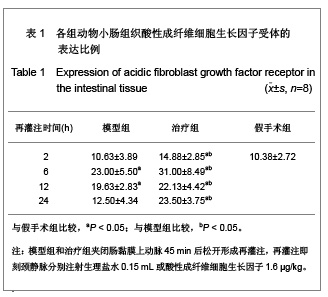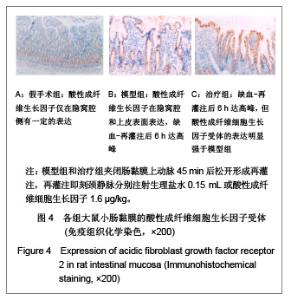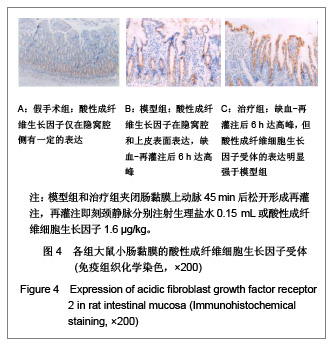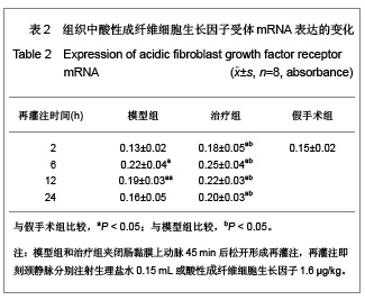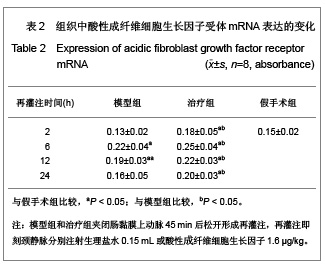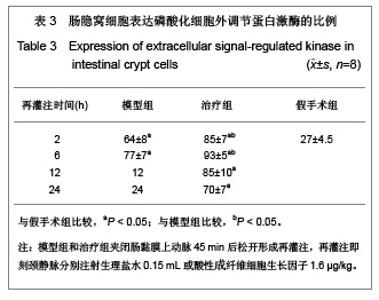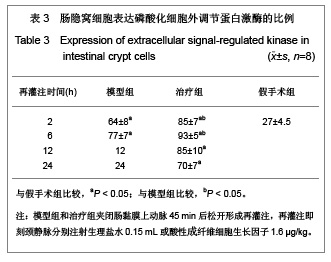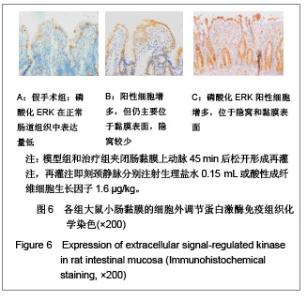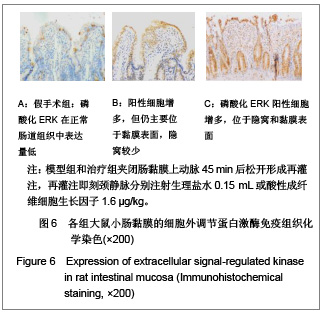Chinese Journal of Tissue Engineering Research ›› 2013, Vol. 17 ›› Issue (11): 1965-1971.doi: 10.3969/j.issn.2095-4344.2013.11.010
Previous Articles Next Articles
Acidic fibroblast growth factor promotes the repair of intestinal ischemia-reperfusion injuries in rats
Sun Hong1, Zhang Ming-hui2, Weng Li-xin3, Sun Tong-zhu4
- 1 Basic Medical School of Inner Mongolia Medical University, Hohhot 010059, Inner Mongolia Autonomous Region, China
2 Gansu University of Traditional Chinese Medicine, Lanzhou 730000, Gansu Province, China
3 Department of Pathology, Basic Medical School of Inner Mongolia Medical University, Hohhot
010059, Inner Mongolia Autonomous Region, China
-
Received:2012-06-06Revised:2012-07-06Online:2013-03-12Published:2013-03-12 -
Contact:Weng Li-xin, Associate professor, Master’s supervisor, Department of Pathology, Basic Medical School of Inner Mongolia Medical University, Hohhot 010059, Inner Mongolia Autonomous Region, China wenglixin2007@yahoo.cn -
About author:Sun Hong★, Master, Basic Medical School of Inner Mongolia Medical University, Hohhot 010059, Inner Mongolia Autonomous Region, China wenglixin2007@yahoo.cn Zhang Ming-hui, Master, Gansu University of Traditional Chinese Medicine, Lanzhou 730000, Gansu Province, China hhhtzmh@163.com Sun Hong and Zhang Ming-hui contributed equally to this work.
CLC Number:
Cite this article
Sun Hong, Zhang Ming-hui, Weng Li-xin, Sun Tong-zhu. Acidic fibroblast growth factor promotes the repair of intestinal ischemia-reperfusion injuries in rats[J]. Chinese Journal of Tissue Engineering Research, 2013, 17(11): 1965-1971.
share this article
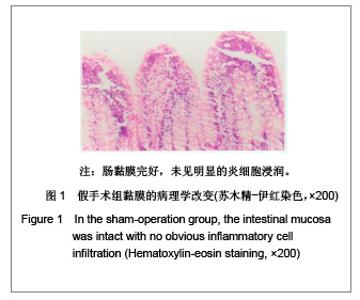
2.1 实验动物数量分析 实验共纳入110只大鼠,造模过程部分死亡,72只大鼠进入结果分析,造模成功率65.5%。实验过程中,模型组和治疗组均有死亡,原因是低血容量休克,均剔除实验,最后每组各取8只进入结果分析。 2.2 小肠组织的病理学改变 假手术组小肠黏膜上皮及腺体完好,未见明显的炎细胞浸润,见图1。小肠缺血-再灌注后早期病变较轻,表现为黏膜和黏膜下充血,固有层多量中性粒细胞浸润,可见黏膜上皮变性、坏死、脱落,再灌注后2,6,12 h较为明显,在再灌注后24 h充血明显减轻,上皮细胞开始再生,见图2。经酸性成纤维细胞生长因子治疗后,小肠黏膜充血、炎细胞浸润及上皮糜烂坏死的程度在各时间点较模型组显著改善,见图3。模型组再灌注24 h的黏膜表现与治疗组再灌注12 h相似。"
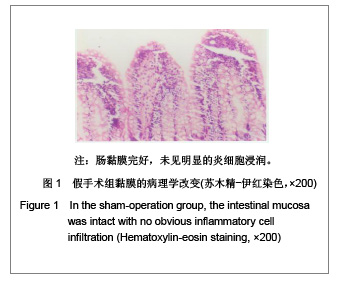
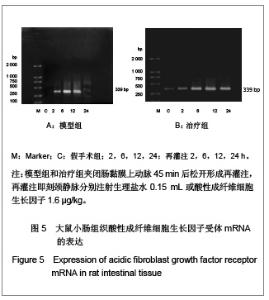
2.5 小肠组织细胞外调节蛋白激酶的表达情况 假手术组和模型组:在正常和伤后大鼠,绒毛上皮、小肠隐窝和固有层均可见到染色阳性的细胞。在假手术组大鼠的绒毛上皮和小肠隐窝,阳性细胞的比例分别为59%和27.5%,表现为散在分布于胞浆内的棕色颗粒,大部分靠近细胞核,少量细胞有核内表达。小肠隐窝核内表达细胞外调节蛋白激酶的细胞主要位于中下部,相当于干细胞、短暂扩增细胞及其初级子代细胞的位置。杯状细胞的胞浆内也可见阳性颗粒。模型组几乎全部绒毛上皮细胞和隐窝细胞表达磷酸化细胞外调节蛋白激酶,但随着再灌注时间的延长,核内表达的比例增加。模型组2 h和6 h时阳性颗粒主要位于胞浆中,12 h则主要位于细胞核,核内表达的比例下降接近假手术组。各组动物的黏膜固有层均有少量的细胞,正常情况下主要位于胞浆,随着再灌注时间延长核内表达增多,在模型组12 h最显著。见表3,图6。"
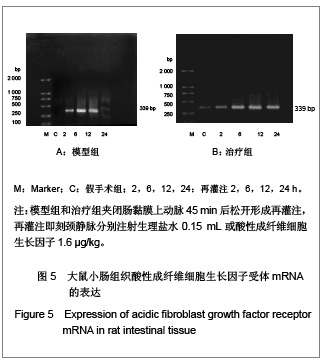
| [1] Feingold KR, Grunfeld C, Heuer JG, et al. FGF21 Is Increased by Inflammatory Stimuli and Protects Leptin-Deficient ob/ob Mice from the Toxicity of Sepsis. Endocrinology. 2012;153(6): 2689-2700.[2] Oh YC, Cho WK, Jeong YH, et al.Anti-Inflammatory Effect of Citrus Unshiu Peel in LPS-Stimulated RAW 264.7 Macrophage Cells. Am J Chin Med. 2012;40(3):611-629.[3] Friedrich RE, Holstein AF, Middendorff R, et al.Vascular wall cells contribute to tumourigenesis in cutaneous neurofibromas of patients with neurofibromatosis type 1. A comparative histological, ultrastructural and immunohistochemical study. Anticancer Res. 2012;32(5):2139-2158.[4] Niu Y, Ye QF, Xiao JS, et al. Zhongguo Putong Waike Zazhi. 2005;16(5):41-43. 牛英,叶启发,肖建生,等.缺血预处理对大鼠肝缺血再灌注损伤后p38和c-jun蛋白表达的影响[J].中国普通外科杂志, 2005, 16(5): 41-43.[5] Peng HB, Wang XH, Feng L, et al. Effect of p38MAPK on proliferation in human embryonic lung fibroblasts in Vitro.Zhonghua Lao Dong Wei Sheng Zhi Ye Bing Za Zhi. 2010;28(11):819-821. [6] Zhao JX, Li P, Huang QF, et al. Zhongguo Bingli Shengli Zazhi. 2007;23(12) 2448-2450. 赵京霞,李萍,黄启福,等.桂皮醛对NIH3T3细胞p38、c-Myc表达的影响[J].中国病理生理杂志,2007,23(12) 2448-2450.[7] Xu XY, Ke YB, Ding LP, et al.Effect of cadmium chloride on the expression and phosphorylation of mitogen-activated protein kinase in normal rat kidney epithelial cells. Zhonghua Yu Fang Yi Xue Za Zhi. 2010;44(12):1131-1135. [8] Shen LJ, Qiu JW, Yu J, et al. Role of p38MAPK in apoptosis of human paratumor cirrhosis hepatocellular cell line QSG-7701 induced by cisplatin. Zhonghua Gan Zang Bing Za Zhi. 2010 Dec;18(12):931-935. [9] Ong SL, Garcea G, Thomasset SC, et al.Surrogate markers of resectability in patients undergoing exploration of potentially resectable pancreatic adenocarcinoma. Gastrointest Surg. 2008;12 (6):1068-1073. [10] Liu RL, Zhang J, Wu W, et al. Zhongguo Zhongxiyi Jiehe Jijiu Zazhi. 2008,15(1):45-47. 刘瑞林,张嘉,吴薇,等.大黄素对肠缺血/再灌注损害保护作用的实验研究[J].中国中西医结合急救杂志,2008,15(1):45-47.[11] Quermie I, Liwei Lu. Role of leptin in immunity. Cell Mol Immunol. 2007;4(1):1-13. [12] West DA, Valentim LM, Lythgoe MF, et al. MR image-guided investigation of regional signal transducers and activators of transcription-1activation in a rat model of focal cerebral ischemia. Neuroscience. 2004;127(2):333-339. [13] Yoshida N, Takagi T, Isozaki Y, et al. Proinflammatory role of protease-activated receptor-2 in intestinal ischemia/reperfusion injury in rats. Mol Med Report. 2011;4(1):81-86. [14] Sonnier DI, Makley AT, Friend LA, et al. Hemorrhagic shock induces a proinflammatory milieu in the gut lumen. J Surg Res. 2011;170(2):272-279. [15] Margaritis EV, Yanni AE, Agrogiannis G, et al. Effects of oral administration of (L)-arginine, (L)-NAME and allopurinol on intestinal ischemia/reperfusion injury in rats. Life Sci. 2011; 88(23-24):1070-1076. [16] Ntinas A, Vrochides D, Iliadis S, et al. Oxygenated perfluorocarbons protect the intestine from the ischemia/ reperfusion injury in rabbits. Vasc Endovascular Surg. 2011; 45(5):426-432. [17] Shulga A, Thomas-Crusells J. Posttraumatic GABA(A)-mediated [Ca2+]i increase is essential for the induction of brain-derived neurotrophic factor-dependent survival of mature central neurons. J Neurosci. 2008;28(27):6996-7005. [18] Hamarat M, Yenilmez A, Erkasap N, et al. Protective effects of leptin on ischemia/reperfusion injury in rat bladder. Chin J Physiol. 2010;53(3):145-150.[19] Bundzikova J, Pirnik Z, Lackovicova L, et al. Brain-liver interactions during liver ischemia reperfusion injury: a minireview. Endocr Regul. 2011;45(3):163-172. [20] Lu T, Jiang Y, Zhou Z, et al. Intranasal ginsenoside Rb1 targets the brain and ameliorates cerebral ischemia/reperfusion injury in rats. Biol Pharm Bull. 2011;34(8):1319-1324. [21] Balyemez G, Sivasli E, Ceylan H, et al. Protective effects of Y-27632 on hypoxia/reoxygenation-induced intestinal injury in newborn rats. J Pediatr Surg. 2011;46(8):1490-1494. [22] Nedvig K, Zapf I, Fekecs T. Examination of warm and cold ischemic injury of small intestine by differential scanning calorimetry. Magy Seb. 2011;64(4):207-212. [23] Yuan Y, Guo H, Zhang Y, et al. Protective effects of L-carnitine on intestinal ischemia/reperfusion injury in a rat model. J Clin Med Res. 2011;3(2):78-84. [24] He X, Xu X, Fan M, et al. Preconditioning with hyperbaric oxygen induces tolerance against renal ischemia-reperfusion injury via increased expression of heme oxygenase-1. J Surg Res. 2011;170(2):271-277. [25] Yuan Y, Guo H, Zhang Y, et al. Protective effects of L-carnitine on intestinal ischemia/reperfusion injury in a rat model. J Clin Med Res. 2011;3(2):78-84. [26] Zhang H, Cui NQ. Zhongguo Zhongxiyi Jiehe Waike Zazhi. 2007,13(3):316. 张浩,崔乃强.肠屏障与多器官功能障碍综合征[J].中国中西医结合外科杂志,2007,13(3):316.[27] Tapuria N, Kumar Y, Habib MM, et al.Remote ischemic preconditioning: a novel protective method from ischemia reperfusion injury--a review.Surg Res. 2008;150(2):304-330.[28] Ishii A, Fyffe-Maricich SL, Furusho M, et al. EXTRACELLULAR SIGNAL-REGULATED KINASE 1/ EXTRACELLULAR SIGNAL-REGULATED KINASE 2 MAPK Signaling is Required to Increase Myelin Thickness Independent of Oligodendrocyte Differentiation and Initiation of Myelination.J Neurosci. 2012;32(26):8855-8864. |
| [1] | Li Zhongfeng, Chen Minghai, Fan Yinuo, Wei Qiushi, He Wei, Chen Zhenqiu. Mechanism of Yougui Yin for steroid-induced femoral head necrosis based on network pharmacology [J]. Chinese Journal of Tissue Engineering Research, 2021, 25(8): 1256-1263. |
| [2] | Li Shanshan, Guo Xiaoxiao, You Ran, Yang Xiufen, Zhao Lu, Chen Xi, Wang Yanling. Photoreceptor cell replacement therapy for retinal degeneration diseases [J]. Chinese Journal of Tissue Engineering Research, 2021, 25(7): 1116-1121. |
| [3] | Fan Junchao, Chen Yong, Song Junjie. Sevoflurance combined with xenon pretreatment protects against spinal cord ischemia-reperfusion injury in a rat model [J]. Chinese Journal of Tissue Engineering Research, 2021, 25(23): 3660-3665. |
| [4] | Huang Zhusong, Lin Yu, Chen Xiang, Lan Jinfu, Guan Yong, Gao Xi. Alcohol extract of Morinda officinalis improves lipid metabolism and bone metabolism in ovariectomized obese rats [J]. Chinese Journal of Tissue Engineering Research, 2021, 25(2): 205-210. |
| [5] | Chen Yutong, Li Chenchen, Liu Yang, Zheng Yaqin, Yang Xihua, An Meiwen. Establishment of an acute radioactive skin injury model in Wistar rats [J]. Chinese Journal of Tissue Engineering Research, 2021, 25(2): 237-241. |
| [6] | Fan Siqi, Zeng Ping, Nong Jiao, Liu Jinfu, Qian Xiaofen. Effect of Tongluo Shenggu Capsule-containing serum on osteoclasts and Toll-like receptor 4/nuclear factor-kappa B signaling pathway [J]. Chinese Journal of Tissue Engineering Research, 2021, 25(14): 2155-2160. |
| [7] | Luo Yicai, Li Hao. Effect of enhanced aryl hydrocarbon receptor expression on inflammatory response and healing of alveolar bone defects in diabetic rats [J]. Chinese Journal of Tissue Engineering Research, 2021, 25(14): 2166-2171. |
| [8] | Yang Luyao, Fu Pengyu, Tang Shuning, Zhu Rongxin, Gong Lijing . Change of Ghrelin-GHSR pathway in 4-week intermittent hypoxic exposure improving obesity in mice [J]. Chinese Journal of Tissue Engineering Research, 2021, 25(11): 1733-1739. |
| [9] | Xu Guofeng, Li Xuebin, Tang Yifan, Zhao Yin, Zhou Shengyuan, Chen Xiongsheng, Jia Lianshun. The role of autophagy in ossification of the human ligamentum flavum [J]. Chinese Journal of Tissue Engineering Research, 2020, 24(8): 1174-1181. |
| [10] |
Cen Yanhui, Xia Meng, Jia Wei, Luo Weisheng, Lin Jiang, Chen Songlin, Chen Wei, Liu Peng, Li Mingxing, Li Jingyun, Li Manli, Ai Dingding, Jiang Yunxia.
Baicalein inhibits the biological behavior of hepatocellular
carcinoma stem cells by downregulation of Decoy receptor 3 expression |
| [11] | Feng Chengqin, Zeng Ping, Luo Jun, Liu Jinfu, Huang Jiaxing. Associations between vitamin D receptor gene polymorphisms and osteoarthritis: a meta-analysis [J]. Chinese Journal of Tissue Engineering Research, 2020, 24(33): 5405-5412. |
| [12] | Cao Qingjun, Yang Fenghua, Wang Hua. Hippocampal astrocytes in juvenile rats with persistent epilepsy: the role of cannabinoid receptor type 2 in regulating MAPK pathway [J]. Chinese Journal of Tissue Engineering Research, 2020, 24(32): 5179-5185. |
| [13] | Zhang Shuang, Xu Xiaomei, Zeng Yang, Yuan Xiaoping, Lin Fuwei. Rev-erbα’s effect on osteoblastogenesis of mouse bone marrow mesenchymal stem cells [J]. Chinese Journal of Tissue Engineering Research, 2020, 24(31): 4921-4926. |
| [14] | Yang Minjie, Liu Wei, Tu Hongfei, Li Li, Fei Sujuan. Protective effect of crocin in ulcerative colitis rats and its related mechanism [J]. Chinese Journal of Tissue Engineering Research, 2020, 24(29): 4673-4679. |
| [15] | Liu Chang, Wang Na, Li Yukun, Xue Peng. Effect of advanced glycation end products on metabolism of bone tissue cells [J]. Chinese Journal of Tissue Engineering Research, 2020, 24(27): 4376-4382. |
| Viewed | ||||||
|
Full text |
|
|||||
|
Abstract |
|
|||||
